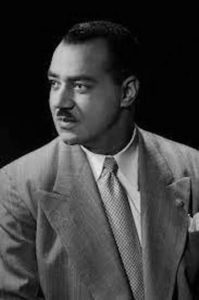
Lawrence Winters
*Lawrence Winters was born on this date in 1915. He was a Black opera singer with an active international career from the mid-1940s through the mid-1960s.
Lawrence Lafayette Whisonant was from King's Creek, South Carolina. He began to study singing privately before entering Howard University in 1941, where he studied singing with Todd Duncan. After graduating from Howard in 1944 with a bachelor's degree in Music, he joined the Eva Jessye Choir. Shortly thereafter, he sang in a concert production of Clarence Cameron White's Ouranga. Following this, he became musical director in the Special Services Division at Fort Huachuca as a member of the U.S. Armed Forces.
After the end of World War II, Winters moved to New York City in 1946, where he was almost immediately engaged for the Broadway musical revue Call Me Mister, portraying a variety of smaller roles. His official recital debut followed in 1947 at Town Hall in New York. Then, in 1948, he debuted as an opera singer in the New York City Opera (NYCO) in Verdi's Aida as Amonasro. He portrayed several more roles with the NYCO over the next seven years, including Dessalines in William Grant Still's Troubled Island (1949). While working with the NYCO in 1949, he came to Europe for the first time, drawing particular acclaim for a recital in Berlin.
He also gave concert tours in Central America and in the United States Virgin Islands. In 1950, he joined the roster of principal baritones at the Royal Swedish Opera, where he sang several roles for two seasons. In 1951, he sang the role of Porgy opposite Camilla Williams's Bess in the most complete recording of Gershwin's Porgy and Bess made up to that time. He debuted with the Hamburg State Opera in 1952, reprising his role in Aida, returning there frequently through 1957. He first appeared with the New York Philharmonic, singing excerpts from operas in concert in 1957.
In 1957, Winters became a principal baritone on the roster at the Deutsche Opera Berlin, where he spent most of his time performing in operas through 1961. He also sang in several roles with the Vienna State Opera and the San Francisco Opera during these years, including the title role in Carl Orff's Die Kluge, Amonasro, Fritz Kothner in Die Meistersinger von Nürnberg, Tonio, and Wolfram in Tannhäuser. In February 1960, he returned to Broadway as Tyree Tucker in Ketti Frings's play The Long Dream. One of the few non-singing roles he portrayed during his career, Winters garnered a Tony Award nomination for his performance. He returned for one last performance at the NYCO in 1962, portraying the role of Porgy.
He returned to the Hamburg State Opera in 1961, working as a principal baritone with the company until his untimely death at 50 in 1965. Winters is buried at the Ohlsdorf Cemetery. Lawrence Whisonant married Aida C. Bearden in Manhattan on June 9, 1943. She was a first cousin of artist Romare Bearden, the son of a journalist and civic activist, Bessye J. Bearden. Aida's mother was Anna Elizabeth Miller by way of her mother's first marriage to the Rev. Primus Priss Alston. Aida was a half-sister of the artist Charles Alston. He was part of the first generation of black opera singers to achieve wide success and is viewed as part of an instrumental group of performers who helped break down the barriers of racial prejudice in the opera world. Lawrence Winters died of cancer in Hamburg, Germany, on September 24, 1965.